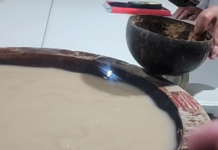Tongan nightingale Tu’imala Kaho has revealed that all the many songs she composed, her favourite is Losehina ‘O Kahala or the White Rose of Kahala.
The song, which was first titled Heimataura, was composed after her daughter Heimataura Anderson married the late Prince ‘Alaivahamama’o Tuku’aho who was later appointed to the Ma’atu title before his death in 2004. He was an older brother of King Tupou VI.
The wedding in 1980 cost the Prince his title because he disobeyed the kingdom’s constitution and the king’s prerogative after marrying a commoner. Five years later Heimataura died of cancer and the ex-prince returned to Tonga from Hawai’i.
Kaho, a well known Tongan poetess, singer and choreographer, told Kaniva News in Auckland this morning that she composed the song to depict how deeply she loved her daughter and how her decision to marry the prince has caused some of the public to criticise them.
Kaho, who turned 79 last month, said Losehina, or white rose, was a symbol of the king as the rose was the king of all western flowers. Kahala was where his daughter and the prince stayed in Hawai’i.
In the song, she wrote about her daughter and said – He ‘ofa na kuo hoko ko e mala or the love you have chosen has put a curse on us, referring to how she as a mother felt embarrassed after her daughter has caused trouble to the royal family.
The song was not allowed on air briefly after it failed the national broadcaster’s scrutiny process.
Scrutiny
Kaho said when she started composing and singing at the age of 18 the only radio station was the government service ZCO, later known as A3Z.
She said all compositions were scrutinised by the station’s Broadcasting Commission’s committee and lyrics were strongly assessed to make sure cultural standards were not breached. This meant many songs were rejected by the committee, she said.
Kaho said this also meant only the best were aired at the time and this had made the radio station famous because the music composition and performance were of high quality.
Today’s technologies made it easier for people to record and broadcast their own composition without going through any scrutiny process.
“In my own opinion Tongan music should revert to the scrutiny process,” Kaho said.
“We are still Tongan because we have our own cultural values. Our feveitokai’aki, faka’apa’apa, respect the nobles and commoners, family respects we have to our mehikitanga and tuofafine.”
Losehina ‘O Kahala
Kaho said her song Losehina ‘o Kahala failed the scrutiny process after she recorded it in Hawai’i and sent it to Tonga to be broadcast.
The chair of the committee at the time was the late Lord Ve’ehala who contacted Kaho and asked her to change the name of the song from Heimataura.
The noble insisted that using the name Heimataura for the song was like telling the royal family that this had served them right.
One line in the song Kaho said she argued Lord Ve’ehala about was written as – “ Afioga kovi ‘eku loi”.
She said she thought Ve’ehala misheard the line from the cassette with the Tongan word ‘afio’ na which means – Your Majesty. She said she corrected the noble and told him the word was afioga, a Samoan word for residence. There was an afioga in Kahala in Hawai’i where her daughter and the prince lived and she was referring to that.
She said after refusing to cooperate with Lord Ve’ehala the song was banned in Tonga.
She said Prince ‘Aho’eiteu, who is now King Tupou VI asked her to change the name so he could be able to get a copy from the radio.
Kaho said she then changed the name of the song from Heimataura to Losehina O Kahala and the song was allowed to be broadcast.
Tongan composition
Kaho said Tongan music today was slack and out of its cultural context.
She said Tongan songs and music should be examined before they were broadcast to the public.
Kaho said she was disappointed that composition of Tongan love songs or hiva kakala today was slipshod.
She said lyrics of some songs were even disrespectful.
She said these days the young poets’ compositions were mostly hualela (humorous in an offensive or vulgar manner) and they copied others’ songs.
Kaho composed her own music and lyrics and sang them. If her composition was meant to be danced, she can train the dancers on how to do the hakas (movement of the body according to the music).
This means Kaho is one of the rare musician in today’s Tongan music community because she can compose, sing and choreograph the sequence of steps and body movements for a performance of dance. This identifies her as a real punake (poetess.)
Cultural standard
Kaho said she kept her composition to the cultural standard, making sure the social order in which the king, nobles and commoners had their respective duties, was respected.
“That is how Tongan composition should be,” she said.
She said there were kakala ‘eiki (fragrant flowers) that could only be used in music composition to refer to the king and the nobles. Those flowers could not be used if the songs were composed to a common lover.
These flowers included heilala, tuitui, maile, langakali, nukonuka, and pipi.
Non-fragrant flowers were regarded as kakala vale and they were used in songs if they were composed about commoners.
Kaho will perform to the public at the Lesieli Tonga auditorium in Mangere, South Auckland this Friday.
The main points
- Tongan nightingale Tu’imala Kaho has revealed that all the many songs she composed, her favourite is Losehina O Kahara.
- The song, which was first titled Heimataura, was composed after her daughter Heimataura Anderson married the late Prince ‘Alaivahamama’o Tuku’aho who was appointed to the Ma’atu title before his death in 2004.
- The wedding cost the Prince his title because he disobeyed the constitution and the king’s prerogative and married a commoner.







